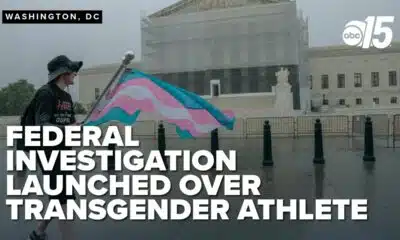Mississippi Today
Early voting proposal killed on last day of Mississippi legislative session
Mississippi will remain one of only three states without no-excuse early voting or no-excuse absentee voting.
Senate leaders, on the last day of their regular 2025 session, decided not to send a bill to Gov. Tate Reeves that would have expanded pre-Election Day voting options. The governor has been vocally opposed to early voting in Mississippi, and would likely have vetoed the measure.
The House and Senate this week overwhelmingly voted for legislation that established a watered-down version of early voting. The proposal would have required voters to go to a circuit clerk’s office and verify their identity with a photo ID.
The proposal also listed broad excuses that would have allowed many voters an opportunity to cast early ballots.
The measure passed the House unanimously and the Senate approved it 42-7. However, Sen. Jeff Tate, a Republican from Meridian who strongly opposes early voting, held the bill on a procedural motion.
Senate Elections Chairman Jeremy England chose not to dispose of Tate’s motion on Thursday morning, the last day the Senate was in session. This killed the bill and prevented it from going to the governor.
England, a Republican from Vancleave, told reporters he decided to kill the legislation because he believed some of its language needed tweaking.
The other reality is that Republican Gov. Tate Reeves strongly opposes early voting proposals and even attacked England on social media for advancing the proposal out of the Senate chamber.
England said he received word “through some sources” that Reeves would veto the measure.
“I’m not done working on it, though,” England said.
Although Mississippi does not have no-excuse early voting or no-excuse absentee voting, it does have absentee voting.
To vote by absentee, a voter must meet one of around a dozen legal excuses, such as temporarily living outside of their county or being over 65. Mississippi law doesn’t allow people to vote by absentee purely out of convenience or choice.
Several conservative states, such as Texas, Louisiana, Arkansas and Florida, have an in-person early voting system. The Republican National Committee in 2023 urged Republican voters to cast an early ballot in states that have early voting procedures.
Yet some Republican leaders in Mississippi have ardently opposed early voting legislation over concerns that it undermines election security.
This article first appeared on Mississippi Today and is republished here under a Creative Commons license.
.
Mississippi Today
Trump nominates Baxter Kruger, Scott Leary for Mississippi U.S. attorney posts
President Donald Trump on Tuesday nominated Baxter Kruger to become Mississippi’s new U.S. attorney in the Southern District and Scott Leary to become U.S. attorney for the Northern District.
The two nominations will head to the U.S. Senate for consideration. If confirmed, the two will oversee federal criminal prosecutions and investigations in the state.
Kruger graduated from the Mississippi College School of Law in 2015 and was previously an assistant U.S. attorney for the Southern District. He is currently the director of the Mississippi Office of Homeland Security.
Sean Tindell, the Mississippi Department of Public Safety commissioner, oversees the state’s Homeland Security Office. He congratulated Kruger on social media and praised his leadership at the agency.
“Thank you for your outstanding leadership at the Mississippi Office of Homeland Security and for your dedicated service to our state,” Tindell wrote. “Your hard work and commitment have not gone unnoticed and this nomination is a testament to that!”
Leary graduated from the University of Mississippi School of Law, and he has been a federal prosecutor for most of his career.
He worked for the U.S. Attorney’s Office in the Western District of Tennessee in Memphis from 2002 to 2008. Afterward, he worked at the U.S. Attorney’s Office for the Northern District of Mississippi in Oxford, where he is currently employed.
Leary told Mississippi Today that he is honored to be nominated for the position, and he looks forward to the Senate confirmation process.
This article first appeared on Mississippi Today and is republished here under a Creative Commons Attribution-NoDerivatives 4.0 International License.
The post Trump nominates Baxter Kruger, Scott Leary for Mississippi U.S. attorney posts appeared first on mississippitoday.org
Note: The following A.I. based commentary is not part of the original article, reproduced above, but is offered in the hopes that it will promote greater media literacy and critical thinking, by making any potential bias more visible to the reader –Staff Editor.
Political Bias Rating: Centrist
This article presents a straightforward news report on President Donald Trump’s nominations of Baxter Kruger and Scott Leary for U.S. attorney positions in Mississippi. It focuses on factual details about their backgrounds, qualifications, and official responses without employing loaded language or framing that favors a particular ideological perspective. The tone is neutral, with quotes and descriptions that serve to inform rather than persuade. While it reports on a political appointment by a Republican president, the coverage remains balanced and refrains from editorializing, thus adhering to neutral, factual reporting.
Mississippi Today
Jackson’s performing arts venue Thalia Mara Hall is now open
After more than 10 months closed due to mold, asbestos and issues with the air conditioning system, Thalia Mara Hall has officially reopened.
Outgoing Mayor Chokwe A. Lumumba announced the reopening of Thalia Mara Hall during his final press conference held Monday on the arts venue’s steps.
“Today marks what we view as a full circle moment, rejoicing in the iconic space where community has come together for decades in the city of Jackson,” Lumumba said. “Thalia Mara has always been more than a venue. It has been a gathering place for people in the city of Jackson. From its first class ballet performances to gospel concerts, Thalia Mara Hall has been the backdrop for our city’s rich cultural history.”
Thalia Mara Hall closed last August after mold was found in parts of the building. The issues compounded from there, with malfunctioning HVAC systems and asbestos remediation. On June 6, the Mississippi State Fire Marshal’s Office announced that Thalia Mara Hall had finally passed inspection.
“We’re not only excited to have overcome many of the challenges that led to it being shuttered for a period of time,” Lumumba said. “We are hopeful for the future of this auditorium, that it may be able to provide a more up-to-date experience for residents, inviting shows that people are able to see across the world, bringing them here to Jackson. So this is an investment in the future.”
In total, Emad Al-Turk, a city contracted engineer and owner of Al-Turk Planning, estimates that $5 million in city and state funds went into bringing Thalia Mara Hall up to code.
The venue still has work to be completed, including reinstalling the fire curtain. The beam in which the fire curtain will be anchored has asbestos in it, so it will have to be remediated. In addition, a second air-conditioning chiller needs to be installed to properly cool the building. Until it’s installed, which could take months, Thalia Mara Hall will be operating at a lower seating capacity of about 800.
“Primarily because of the heat,” Al-Turk said. “The air conditioning would not be sufficient to actually accommodate the 2,000 people at full capacity, but starting in the fall, that should not be a problem.”
Al-Turk said the calendar is open for the city to begin booking events, though none have been scheduled for July.
“We’re very proud,” he said. “This took a little bit longer than what we anticipated, but we had probably seven or eight different contractors we had to coordinate with and all of them did a superb job to get us where we are today.”
This article first appeared on Mississippi Today and is republished here under a Creative Commons Attribution-NoDerivatives 4.0 International License.
The post Jackson’s performing arts venue Thalia Mara Hall is now open appeared first on mississippitoday.org
Note: The following A.I. based commentary is not part of the original article, reproduced above, but is offered in the hopes that it will promote greater media literacy and critical thinking, by making any potential bias more visible to the reader –Staff Editor.
Political Bias Rating: Centrist
The article presents a straightforward report on the reopening of Thalia Mara Hall in Jackson, focusing on facts and statements from city officials without promoting any ideological viewpoint. The tone is neutral and positive, emphasizing the community and cultural significance of the venue while detailing the challenges overcome during renovations. The coverage centers on public investment and future prospects, without partisan framing or editorializing. While quotes from Mayor Lumumba and a city engineer highlight optimism and civic pride, the article maintains balanced, factual reporting rather than advancing a political agenda.
Mississippi Today
‘Hurdles waiting in the shadows’: Lumumba reflects on challenges and triumphs on final day as Jackson mayor
On his last day as mayor of Jackson, Chokwe Antar Lumumba recounted accomplishments, praised his executive team and said he has no plans to seek office again.
He spoke during a press conference outside of the city’s Thalia Mara Hall, which was recently cleared for reopening after nearly a year of remediation. The briefing, meant to give media members a peek inside the downtown theater, marked one of Lumumba’s final forays as mayor.
Longtime state Sen. John Horhn — who defeated Lumumba in the Democratic primary runoff — will be inaugurated as mayor Tuesday, but Lumumba won’t be present. Not for any contentious reason, the 42-year-old mayor noted, but because he returns to his private law practice Tuesday.
“I’ve got to work now, y’all,” Lumumba said. “I’ve got a job.”
Thalia Mara Hall’s presumptive comeback was a fitting end for Lumumba, who pledged to make Jackson the most radical city in America but instead spent much of his eight years in office parrying one emergency after another. The auditorium was built in 1968 and closed nearly 11 months ago after workers found mold caused by a faulty HVAC system – on top of broken elevators, fire safety concerns and vandalism.
“This job is a fast-pitched sport,” Lumumba said. “There’s an abundance of challenges that have to be addressed, and it seems like the moment that you’ve gotten over one hurdle, there’s another one that is waiting in the shadows.”
Outside the theater Monday, Lumumba reflected on the high points of his leadership instead of the many crises — some seemingly self-inflicted — he faced as mayor.
He presided over the city during the coronavirus pandemic and the rise in crime it brought, but also the one-two punch of the 2021 and 2022 water crises, exacerbated by the city’s mismanagement of its water plants, and the 18-day pause in trash pickup spurred by Lumumba’s contentious negotiations with the city council in 2023.
Then in 2024, Lumumba was indicted alongside other city and county officials in a sweeping federal corruption probe targeting the proposed development of a hotel across from the city’s convention center, a project that has remained stalled in a 20-year saga of failed bids and political consternation.
Slated for trial next year, Lumumba has repeatedly maintained his innocence.
The city’s youngest mayor also brought some victories to Jackson, particularly in his first year in office. In 2017, he ended a furlough of city employees and worked with then-Gov. Phil Bryant to avoid a state takeover of Jackson Public Schools. In 2019, the city successfully sued German engineering firm Siemens and its local contractors for $89 million over botched work installing the city’s water-sewer billing infrastructure.
“I think that that was a pivotal moment to say that this city is going to hold people responsible for the work that they do,” Lumumba said.
Lumumba had more time than any other mayor to usher in the 1% sales tax, which residents approved in 2014 to fund infrastructure improvements.
“We paved 144 streets,” he said. “There are residents that still are waiting on their roads to be repaved. And you don’t really feel it until it’s your street that gets repaved, but that is a significant undertaking.”
And under his administration, crime has fallen dramatically recently, with homicides cut by a third and shootings cut in half in the last year.
Lumumba was first elected in 2017 after defeating Tony Yarber, a business-friendly mayor who faced his own scandals as mayor. A criminal justice attorney, Lumumba said he never planned to seek office until the stunning death of his father, Chokwe Lumumba Sr., eight months into his first term as mayor in 2014.
“I can say without reservation, and unequivocally, we remember where we started. We are in a much better position than we started,” Lumumba said.
Lumumba said he has sat down with Horhn in recent months, answered questions “as extensively as I could,” and promised to remain reachable to the new mayor.
This article first appeared on Mississippi Today and is republished here under a Creative Commons Attribution-NoDerivatives 4.0 International License.
The post 'Hurdles waiting in the shadows': Lumumba reflects on challenges and triumphs on final day as Jackson mayor appeared first on mississippitoday.org
Note: The following A.I. based commentary is not part of the original article, reproduced above, but is offered in the hopes that it will promote greater media literacy and critical thinking, by making any potential bias more visible to the reader –Staff Editor.
Political Bias Rating: Center-Left
The article reports on outgoing Jackson Mayor Chokwe Antar Lumumba’s reflections without overt editorializing but subtly frames his tenure within progressive contexts, emphasizing his self-described goal to make Jackson “the most radical city in America.” The piece highlights his accomplishments alongside challenges, including public crises and a federal indictment, maintaining a factual tone yet noting contentious moments like labor disputes and governance issues. While it avoids partisan rhetoric, the focus on social justice efforts, infrastructure investment, and crime reduction, as well as positive framing of Lumumba’s achievements, aligns with a center-left perspective that values progressive governance and accountability.
-
News from the South - Georgia News Feed6 days ago
Are you addicted to ‘fridge cigarettes’? Here’s what the Gen Z term means
-
News from the South - Oklahoma News Feed7 days ago
RFK Jr. Brings MAHA to Oklahoma
-
Local News7 days ago
St. Martin trio becomes the first females in Mississippi to sign Flag Football Scholarships
-
News from the South - South Carolina News Feed6 days ago
Federal investigation launched into Minnesota after transgender athlete leads team to championship
-
News from the South - Tennessee News Feed5 days ago
Democratic resolution to block military action in Iran fails to advance in US Senate
-
The Center Square4 days ago
U.S. Senate prepares for passage of One Big Beautiful Bill Act | National
-
News from the South - Virginia News Feed7 days ago
‘Hallowed ground, desecrated’: ICE sweeps at Chesterfield court draw fierce backlash
-
News from the South - Florida News Feed6 days ago
US Supreme Court allows SC to remove Planned Parenthood from list of Medicaid providers















































